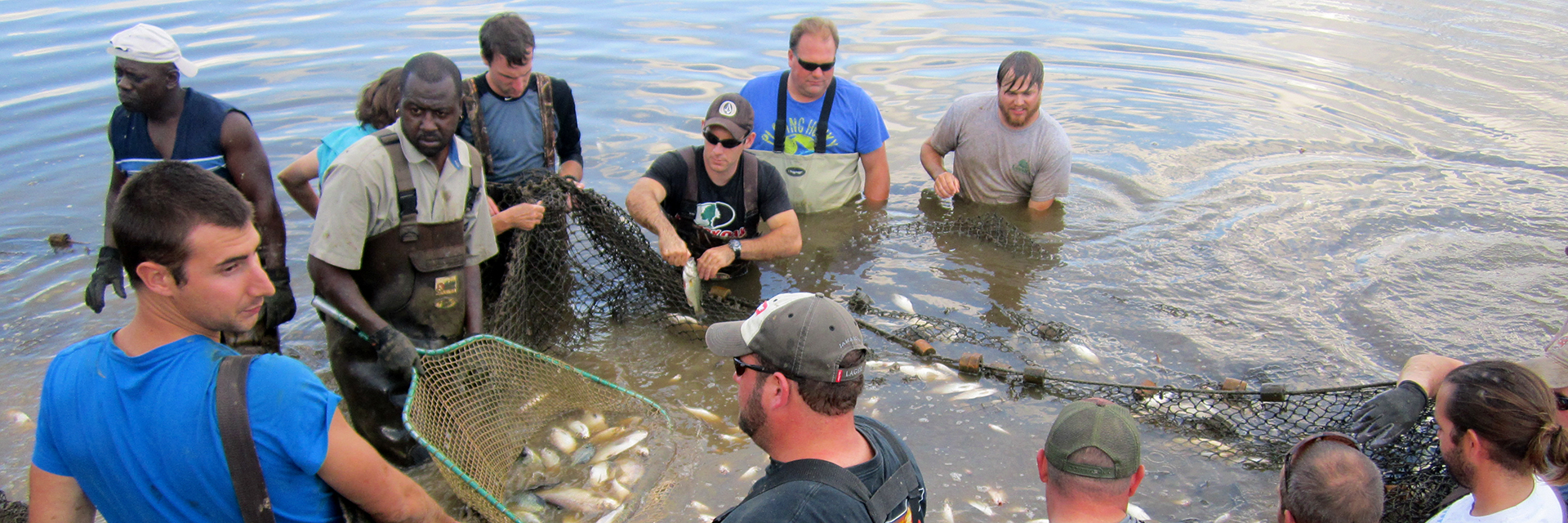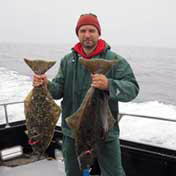

Matt Catalano
Associate Professor
School of Fisheries, Aquaculture & Aquatic Sciences
(334) 844-7366
mjc0028@auburn.edu
Get In Touch
Address:
217 Swingle Hall
Auburn Univ, AL 36849
Biography
Matt is from the Lake Erie port city of Lorain, Ohio. He obtained a B.S. in zoology at Miami University. After brief stints at Yellowstone National Park and the Illinois Natural History Survey, he received an M.S. in fisheries at the University of Wisconsin-Stevens Point, where I studied the effects of dam removal on riverine fish communities. Matt obtained his Ph.D. at the University of Florida where he investigated gizzard shad population dynamics. More recently, he completed a post-doctoral position at the Quantitative Fisheries Center at Michigan State University where he conducted research on management and assessment of several fish stocks including Chinook and chum of western Alaska, Lake Erie walleye, Illinois River bighead and silver carp, and a few others.
PROFESSIONAL AFFILIATIONS
- American Fisheries Society
- Auburn Chapter, American Fisheries Society
HONORS & AWARDS
- Dean’s Grantsmanship Award, 2016, College of Agriculture, Auburn University.
- Director’s Award for Research – Junior Faculty, 2016, College of Ag., Auburn University.
- Dean’s Grantsmanship Award, 2015, College of Agriculture, Auburn University.
- Dean’s Grantsmanship Award, 2014, College of Agriculture, Auburn University.
- Honorable Mention, 2010, AT&T MSU Award Competition in Instructional Technology for online course: Maximum Likelihood Estimation for Natural Resources and Ecology, Michigan State University
- Outstanding Dissertation Award, 2009, Program for Fisheries and Aquatic Sciences, University of Florida
- Best Student Presentation Award, 2009, Florida Chapter of the American Fisheries Society Conference
- Ph.D. Student of the Year Award, 2008, University of Florida, Department of Fisheries and Aquatic Sciences
- Roger Rottmann Scholarship, Florida Chapter of the American Fisheries Society, 2008
- Best Paper Award, 2007, North American Journal of Fisheries Management
- University of Florida Alumni Fellowship, 2005-2009
- Graduate Cum Laude, Miami University, 1997
Research
RESEARCH
My research is focused on population dynamics and fisheries management. I am interested in demographic responses to harvesting, factors affecting recruitment of fishes, stock assessment and quantitative methods, management policy evaluation, risk analysis, structured decision making and adaptive management, and the ecosystem-level effects of exploitation.
Courses
FISH 7540 Quantitative Techniques in Fishery Assessment
- Credits: 3
- When offered: spring semester of odd-numbered years
This graduate-level course aims to acquaint students with essential quantitative and interpretational tools to test hypotheses and make management decisions regarding fish and other aquatic organisms. In particular, students will become familiar with how to harness recent advances in computer speed to allow them to tailor their models to their data rather than vice versa. The course reviews elements of survey design, classical linear models for hypothesis testing, maximum likelihood estimation, and Bayesian analysis. Students will also acquire a working knowledge of the R statistical software program to analyze their data. The course consists of a lecture and laboratory component. The lecture will cover critical concepts in data analysis and modeling whereas the lab will allow student to put what they’ve learned into practice.
FISH 7530 Fish Population Dynamics
- 3 credits
- When offered: spring semester of even-numbered years
The course explores the fundamental dynamics of fish populations and fisheries with an emphasis on estimation of critical parameters and simulation modeling to forecast management outcomes. Students will learn introductory stock assessment methods and will build computer models to assess fish populations using the open-access program R. The course is intended for graduate students in SFAAS or other natural-resource departments.
Publications
- Dorner, B., M. J. Catalano, R. M. Peterman. In press. Spatial and temporal patterns of covariation in productivity of Chinook salmon populations of the Northeastern Pacific. Canadian Journal of Fisheries and Aquatic Sciences.
- Crow, J. C., Ostrand, K. G., Forstner, M. R.J., Catalano, M. and Tomasso, J. R. In press. Effects of nitrogenous wastes on survival of the Barton Springs salamander (Eurycea sosorum). Environmental Toxicology and Chemistry.
- Staton, B. A., M. J. Catalano, T. M. Farmer, A. Abebe, F. S. Dobson. 2017. Development and evaluation of a migration timing forecast model for Kuskokwim River Chinook salmon. Fisheries Research 194: 9-21.
- Sackett, D. K. and M. J. Catalano. 2017. Spatial heterogeneity, variable rewards, tag loss, and tagging mortality affect the performance of mark–recapture designs to estimate exploitation: an example using Red Snapper in the Northern Gulf of Mexico. North American Journal of Fisheries Management 37(3): 558-573.
- Feltz, N. G. and M. J. Catalano. 2017. Statistical catch-free age-structured assessment to estimate year-class strength for inland recreational fisheries: a Largemouth Bass example. North American Journal of Fisheries Management 37(1): 64-77.
- Staton, B. A., M. J. Catalano, and S. J. Fleischman. 2017. From sequential to integrated Bayesian analyses: exploring the continuum with a Pacific salmon spawner-recruit model. Fisheries Research 186:237-247.
- Jones, M. L., M. J. Catalano, L. K. Peterson, and A. M. Berger. 2016. Stakeholder-centered development of a harvest control rule for Lake Erie walleye Sander vitreus. In C. T. Edwards and D. J. Dankel, editors. Management science in fisheries: a practical introduction to simulation-based methods. Taylor and Francis.
- Catalano, M. J. and M. H. Schaus. 2016. Harvest-induced size structure shifts alter nutrient release by a population of omnivorous fish. Transactions of the American Fisheries Society, 145:637-648.
- Stoeckel, J, B. Helms, M.J. Catalano, J. Miller, K. Gibson, and P.M. Stewart. 2015. Field and model-based evaluation of a low-cost sampling protocol for a coordinated, crayfish life-history sampling effort. Freshwater Crayfish 21(1): 131-141.
- Catalano, M.J. and M. A. Bozek. 2015. Influence of environmental variables on catostomid spawning chronology in a warmwater river. American Midland Naturalist 173: 1-16.
- Catalano, M.J. and M. L. Jones. 2014. A simulation-based evaluation of in-season management tactics for anadromous fisheries: accounting for risk in the Yukon River fall chum salmon fishery. North American Journal of Fisheries Management 34: 1227-1241.
- Tsehaye, I, M. J. Catalano, G. Sass, D. Glover, and B. Roth. 2013. Prospects for fishery-induced collapse of invasive Asian carp in the Illinois River. Fisheries 38: 445-454.
- Fleischman, S. J. and M. J. Catalano. 2013. An age-structured state-space stock recruit model for Pacific salmon Oncorhynchus spp. Canadian Journal of Fisheries and Aquatic Sciences 70:401-414.
- Allen, M. S., Rogers, M. W., Catalano, M. J., Gwinn, D. C., & Walsh, S. J. 2013. Assessing the potential for the angling of nesting males to influence largemouth bass recruitment should consider the quality of nesting individuals: response to comment. Transactions of the American Fisheries Society, 142:419-421.
- Catalano, M. J. and M. S. Allen. 2011. Exploring fish removal strategies for biomanipulation that account for uncertainty in the strength of density dependence of target species. North American Journal of Fisheries Management 31:1153-1162.
- Allen, M. S., M. W. Rogers, M. J. Catalano, and D. G. Gwinn. 2011. Evaluating the potential for stock size to limit recruitment in largemouth bass. Transactions of the American Fisheries Society 140:1093-1100.
- Catalano, M. J. and M. S. Allen. 2011. A whole-lake density reduction to assess compensatory responses of gizzard shad. Canadian Journal of Fisheries and Aquatic Sciences 68:955-968.
- Tetzlaff, J. C., M. J. Catalano, M. S. Allen, and W. E. Pine, III. 2011. Evaluation of two methods for indexing fish year-class strength: catch-curve residuals and cohort method. Fisheries Research 109: 303-310.
- Catalano, M. J. and M. S. Allen. 2010. A size- and age-structured model to estimate fish recruitment, growth, mortality, and gear selectivity. Fisheries Research 105:38-45.
- Catalano, M. J., M. S. Allen, M. H. Schaus, D. Buck, J. Beaver. 2010. Evaluating short-term effects of omnivorous fish removal on water quality and zooplankton at a subtropical lake. Hydrobiologia 165:159-169.
- Bonvechio, K. I., M. J. Catalano, R. E. Sawyer, S. Crawford. 2009. Determining sample size for monitoring fish communities using electrofishing in three Florida lakes. Fisheries Management and Ecology 16:409-412.
- Catalano, M. J., A. C. Dutterer, W. E. Pine, III, and M. S. Allen. 2009. Effects of variable mortality and recruitment on performance of catch-curve residuals as indicators of fish year class strength. North American Journal of Fisheries Management 29:295-305.
- Allen, M. S., P. Brown, J. Douglas, W. Fulton, M. J. Catalano. 2009. An assessment of recreational fishery harvest policies for Murray cod in southeast Australia. Fisheries Research 95:260-267.
- Binion, G. R., M. S. Allen, M. J. Catalano, W. E. Pine III. 2009. Direct and indirect estimates of black crappie size selectivity to a common sampling gear: potential biases and limitations for assessment. Fisheries Research 95:47-54.
- De Brabandere, L., M. J. Catalano, T. K. Frazer, M. S. Allen. 2009. Stable isotope evidence of ontogenetic changes in the diet of gizzard shad (Dorosoma cepedianum). Journal of Fish Biology 74:105-109.
- Coggins, L. G., Jr., M. J. Catalano, M. S. Allen, W. E. Pine, III, and C. J. Walters. 2007. Effects of cryptic mortality and the hidden costs of using length limits in fishery management. Fish and Fisheries 8:196-210.
- Catalano, M. J., M. A. Bozek, and T. D. Pellett. 2007. Effects of dam removal on fish assemblage structure and spatial distributions in the Baraboo River, Wisconsin. North American Journal of Fisheries Management 27:519-530.
- Stanley, E. H., M. J. Catalano, N. Mercado-Silva, C. H. Orr. 2007. Effects of dam removal on brook trout in a Wisconsin stream. River Research and Applications 23:792-798.
- Catalano, M. J., M. S. Allen, and D. J. Murie. 2006. Effects of variable flows on water chemistry gradients and fish communities in the Hillsborough River, Florida. North American Journal of Fisheries Management 26:108-118.
- Catalano, M. J., S. R. Chipps, M. A. Bouchard, and D. H. Wahl. 2001. Evaluation of injectable fluorescent tags for marking centrarchid fishes: retention rate and effects on vulnerability to predation. North American Journal of Fisheries Management 21:911-917.
